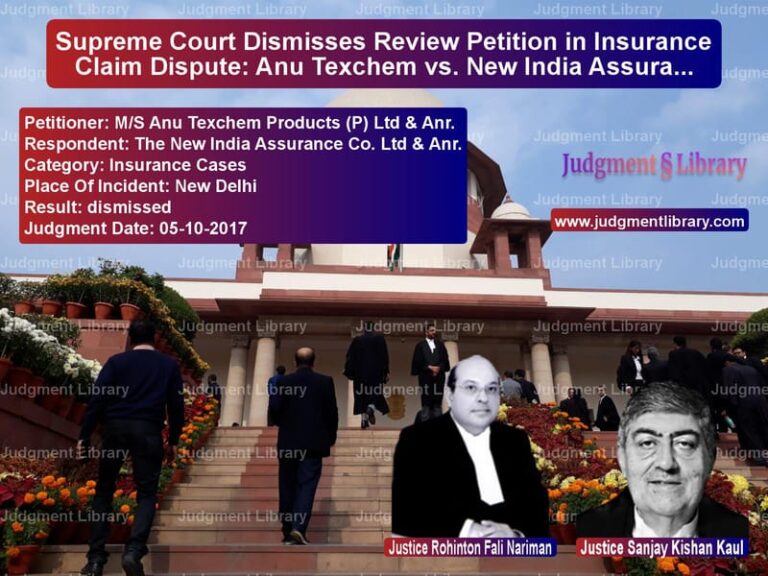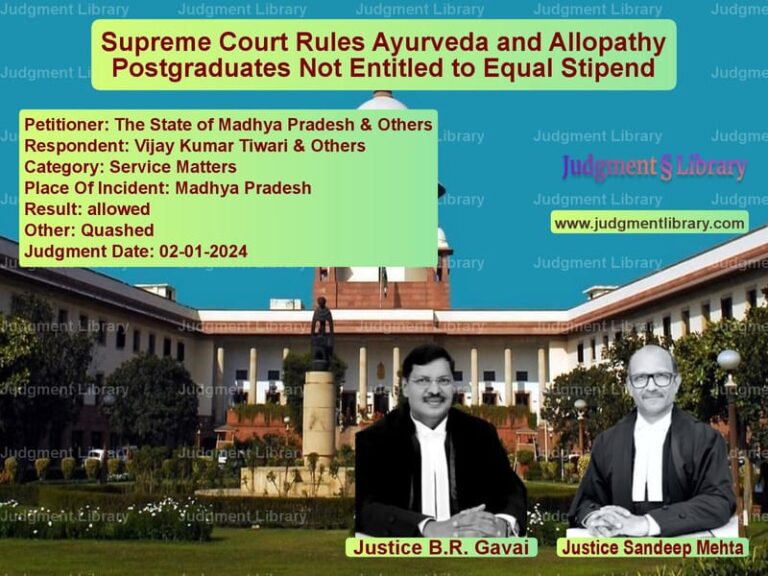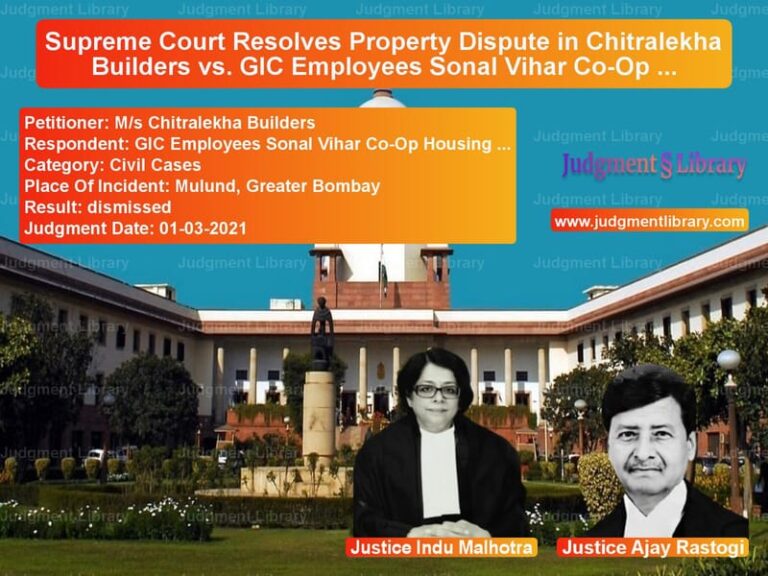Bank Employee Misconduct and Disciplinary Action: Supreme Court’s Ruling on Delay in Criminal Trials
The Supreme Court of India, in the case of State Bank of India & Ors. vs. Neelam Nag, examined a critical legal issue concerning whether disciplinary proceedings against a bank employee accused of financial misconduct should be put on hold until the criminal trial is concluded. The case highlights the balance between an employee’s rights and an employer’s obligation to maintain discipline within the organization.
The primary issue before the Court was whether the High Court was justified in directing a stay on disciplinary proceedings initiated by the appellant bank against the respondent until the closure of prosecution evidence in the criminal case. This case sets an important precedent in labor law, particularly in the context of public sector employees and financial misconduct.
Background of the Case
The respondent, Neelam Nag, was employed as an Assistant (Clearing) in the clerical cadre of the State Bank of India. She was accused of engaging in financial misconduct that resulted in a loss of Rs. 44,40,819 to the bank. The allegations against her included allowing fraudulent transactions, misplacing clearing instruments, and facilitating financial misappropriation.
The bank initiated disciplinary proceedings against her, but at the same time, a criminal case was lodged. The question arose whether these two proceedings could run simultaneously or if the disciplinary proceedings should be deferred until the criminal trial reached its conclusion.
Allegations Against Neelam Nag
- Neelam Nag allegedly introduced Laxman Parsad Ratre, an employee of Bhilai Steel Plant, to open a bank account with the appellant bank.
- It was found that she allowed fraudulent transactions involving the said account, leading to a significant financial loss.
- On November 7, 2006, she was placed under suspension due to serious financial irregularities and misconduct.
- She submitted a written confession on November 8, 2006, wherein she admitted her misdeeds and promised to return the money lost by the bank.
“I admit that I have done a wrong deed and I am suffering from the feeling of guilt. I assure you that I will not commit this kind of mistake in the future. If I fail in my efforts to compensate for the financial loss, you are free to take appropriate action against me.”
Despite her confession, a First Information Report (FIR) was lodged against her under Sections 409 and 34 of the Indian Penal Code (IPC). The charges included criminal breach of trust by a public servant and acts committed in furtherance of a common intention.
Arguments of the Petitioner (State Bank of India)
- There was no legal or procedural bar on simultaneously conducting disciplinary proceedings and criminal trials.
- Any delay in disciplinary proceedings due to the pendency of a criminal case would be detrimental to the bank’s interests.
- The respondent was responsible for prolonging the criminal trial, and it would be unjust to allow indefinite delay in disciplinary action.
- Clause 4 of the Memorandum of Settlement did not prohibit disciplinary action in such circumstances.
Arguments of the Respondent (Neelam Nag)
- The allegations in the criminal case and disciplinary proceedings were based on the same facts, and disciplinary action should be stayed to prevent self-incrimination.
- Clause 4 of the Memorandum of Settlement provided that an employee could not be subjected to departmental proceedings until the criminal trial was completed.
- Proceeding with the disciplinary action would compel her to reveal her defense in the criminal case, which would prejudice her trial.
Supreme Court’s Judgment
The Supreme Court ruled that while there is no absolute legal bar on conducting disciplinary and criminal proceedings simultaneously, a balance must be maintained between expeditious disciplinary action and the right to a fair trial.
Key Observations by the Court:
- The Court emphasized that disciplinary proceedings should not be stalled indefinitely due to pending criminal trials.
- The Court referred to its ruling in Karnataka SRTC vs. M.G. Vittal Rao, which outlined that disciplinary action could proceed unless complex legal and factual issues were involved.
- The delay in the criminal trial was found to be unjustifiable, and the respondent herself contributed to these delays by seeking repeated adjournments.
The Court modified the High Court’s order and directed that the criminal trial must be concluded within one year. If the trial remained incomplete, the bank could proceed with disciplinary action against the respondent.
“Pendency of a criminal trial for around 10 years, by no means, can be said to be a reasonable timeframe to withhold the disciplinary proceedings. The disciplinary proceedings instituted against the respondent cannot brook any further delay.”
Conclusion
The judgment reinforces that public sector banks and other institutions cannot be indefinitely restrained from taking disciplinary action against employees accused of serious financial misconduct. The ruling balances the employee’s right to a fair trial with the employer’s responsibility to uphold discipline and financial accountability.
This case serves as a crucial precedent in employment and financial fraud cases, ensuring that employees cannot misuse legal provisions to delay disciplinary actions indefinitely.
Don’t miss out on the full details! Download the complete judgment in PDF format below and gain valuable insights instantly!
Download Judgment: State Bank of India vs Neelam Nag Supreme Court of India Judgment Dated 16-09-2016-1741883649884.pdf
Direct Downlaod Judgment: Direct downlaod this Judgment
See all petitions in Employment Disputes
See all petitions in Disciplinary Proceedings
See all petitions in Public Sector Employees
See all petitions in Judgment by T.S. Thakur
See all petitions in Judgment by A M Khanwilkar
See all petitions in partially allowed
See all petitions in Modified
See all petitions in supreme court of India judgments September 2016
See all petitions in 2016 judgments
See all posts in Service Matters Category
See all allowed petitions in Service Matters Category
See all Dismissed petitions in Service Matters Category
See all partially allowed petitions in Service Matters Category







